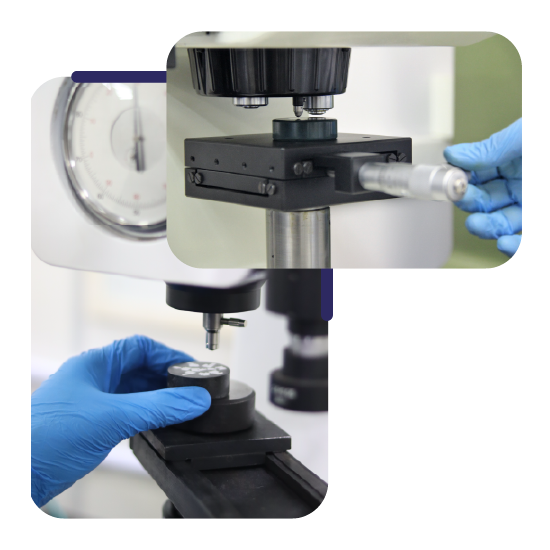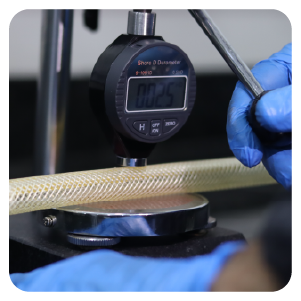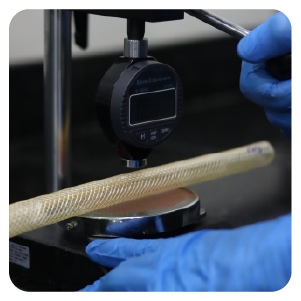
Materiais metálicos
Seja no desenvolvimento de projetos ou durante a fabricação, é fundamental conhecer as propriedades dos materiais e avaliar o atendimento de requisitos de projeto ou normativos. Nesse sentido, os ensaios realizados pelo Laboratório SCiTec visam avaliar e determinar as propriedades dos materiais sob diferentes condições de fornecimento e processamento.
Contando com amplo escopo acreditado pela Cgcre, equipe técnica qualificada e estrutura de ponta, o Laboratório SCiTec surge como parceiro ideal para o setor industrial. Nosso laboratório realiza os principais ensaios para avaliação de materiais metálicos, dentre outros:
Metalografia;
Tração;
Análise química;
Dureza;
Microdureza;
Dobramento;
Fadiga axial;
Fadiga rotativa;
Impacto Charpy.



Polímeros
O laboratório SCiTec conta com infraestrutura e amplo escopo de serviços acreditados pela Cgcre, para atuar na execução de análises térmicas, físico-químicas e mecânicas dos materiais poliméricos.
Os testes e análises realizados pelo laboratório envolvem:
Absorção de água;
Análise térmica dinâmico-mecânica (DMA ou DMTA);
Calorimetria exploratória diferencial (DSC);
Coeficiente de expansão térmica linear;
Colorimetria;
Compressão;
Compression set;
Cromatografia gasosa acoplada espectrometria de massas (GC-MS);
Densidade;
Difratometria de raios-X (DRX);
Dispersão de pigmentos;
Dureza IRHD;
Dureza shore A ou D;
Espectroscopia no infravermelho (FTIR);
Fluorescência de raios-X (FRX);
Fogging;
Impacto charpy a 23°C;
Impacto izod a 23°C;
Índice de fluidez (MFI);
Índice de oxidação;
Flamabilidade;
Flexão;
Rasgamento a 23°C;
Reometria capilar;
Temperatura de amolecimento (Vicat);
Temperatura de deflexão térmica (HDT);
Tempo de indução oxidativa (OIT);
Teor de carga;
Teor de cinzas;
Teor de extraíveis;
Teor de umidade;
Termogravimetria (TG);
Tração a 23°C;
Viscosidade.
Normas
AATCC Test Method 97 – 2009 Extractable Content of Textiles
ABNT NBR 15536-1 – Sistemas para adução de água, coletores-tronco, emissários de esgoto sanitário e águas pluviais – Tubos e conexões de plástico reforçado de fibra de vidro (PRFV) – Parte 1: Tubos e juntas para adução de água
ABNT NBR 9023 – Termoplásticos – Determinação do índice de fluidez
ABNT NBR 9147 – Fios e cabos para telecomunicações — Fluidez — Método de ensaio
ABNT NBR ISO 18553 – Método para avaliação do grau de dispersão de pigmentos ou negro-de-fumo em tubos, conexões e compostos poliolefínicos
ABNT NBR ISO 3795 – Veículos rodoviários, tratores e máquinas agrícolas e florestais — Determinação do comportamento de combustão dos materiais interiores
ABNT NBR NM 82 – Tubos e conexões de PVC – Determinação da temperatura de amolecimento “Vicat”
ABNT NBR NM 84 – Tubos e conexões de PVC – Determinação do teor de cinzas
ABNT NM 23 – Cimento portland e outros materiais em pó – Determinação da massa específica
ASTM C1557 – Standard Test Method for Tensile Strength and Young’s Modulus of Fibers
ASTM C158 – Flexural Bend Testing for Glass
ASTM D1238 – Standard Test Method for Melt Flow Rates of Thermoplastics by Extrusion Plastometer
ASTM D1415 – Standard Test Method for Rubber Property—International Hardness
ASTM D1506 – Standard Test Methods for Carbon Black—Ash Content
ASTM D1525 – Standard Test Method for Vicat Softening Temperature of Plastics
ASTM D1621 – Standard Test Method for Compressive Properties of Rigid Cellular Plastics
ASTM D2240 – Standard Test Method for Rubber Property—Durometer Hardness
ASTM D2244 – Standard Test Method for Calculation of Color Differences From Instrumentally Measured Color Coordinates
ASTM D256 – Standard Test Methods for Determining the Izod Pendulum Impact Resistance of Plastics
ASTM D2584 – Standard Test Method for Ignition Loss of Cured Reinforced Resins
ASTM D3418 – Standard Test Method for Transition Temperatures and Enthalpies of Fusion and Crystallization of Polymers by Differential Scanning Calorimetry
ASTM D3677 – Standard Test Methods for Rubber—Identification by Infrared Spectrophotometry
ASTM D3835 – Standard Test Method for Determination of Properties of Polymeric Materials by Means of a Capillary Rheometer
ASTM D3895 – Standard Test Method for Oxidative-Induction Time of Polyolefins by Differential Scanning Calorimetry
ASTM D395 – Standard Test Methods for Rubber Property—Compression Set
ASTM D4065 – Standard Practice for Plastics: Dynamic Mechanical Properties: Determination and Report of Procedures
ASTM D412 – Standard Test Methods for Vulcanized Rubber and Thermoplastic Elastomers—Tension
ASTM D4603 – Standard Test Method for Determining Inherent Viscosity of Poly(Ethylene Terephthalate) (PET) by Glass Capillary Viscometer
ASTM D4747 – Standard Test Method for Determining Unreacted Monomer Content of Latexes Using Gas-Liquid Chromatography (Withdrawn 2019)
ASTM D4812 – Standard Test Method for Unnotched Cantilever Beam Impact Resistance of Plastics
ASTM D5026 – Standard Test Method for Plastics: Dynamic Mechanical Properties: In Tension
ASTM D5279 – Standard Test Method for Plastics: Dynamic Mechanical Properties: In Torsion
ASTM D5381 – Standard Guide for X-Ray Fluorescence (XRF) Spectroscopy of Pigments and Extenders
ASTM D5418 – Standard Test Method for Plastics: Dynamic Mechanical Properties: In Flexure (Dual Cantilever Beam)
ASTM D5630 – Standard Test Method for Ash Content in Plastics
ASTM D570 – Standard Test Method for Water Absorption of Plastics
ASTM D6110 – Standard Test Method for Determining the Charpy Impact Resistance of Notched Specimens of Plastics
ASTM D624 – Standard Test Method for Tear Strength of Conventional Vulcanized Rubber and Thermoplastic Elastomers
ASTM D6247 – Standard Test Method for Determination of Elemental Content of Polyolefins by Wavelength Dispersive X-ray Fluorescence Spectrometry
ASTM D635 – Standard Test Method for Rate of Burning and/or Extent and Time of Burning of Plastics in a Horizontal Position
ASTM D6370 – Standard Test Method for Rubber—Compositional Analysis by Thermogravimetry (TGA)
ASTM D638 – Standard Test Method for Tensile Properties of Plastics
ASTM D648 – Standard Test Method for Deflection Temperature of Plastics Under Flexural Load in the Edgewise Position
ASTM D6869 – Standard Test Method for Coulometric and Volumetric Determination of Moisture in Plastics Using the Karl Fischer Reaction (the Reaction of Iodine with Water)
ASTM D695 – Standard Test Method for Compressive Properties of Rigid Plastics
ASTM D789 – Standard Test Method for Determination of Relative Viscosity of Concentrated Polyamide (PA) Solutions
ASTM D790 – Standard Test Methods for Flexural Properties of Unreinforced and Reinforced Plastics and Electrical Insulating Materials
ASTM D792 – Standard Test Methods for Density and Specific Gravity (Relative Density) of Plastics by Displacement
ASTM D882 – Standard Test Method for Tensile Properties of Thin Plastic Sheeting
ASTM E1131 – Standard Test Method for Compositional Analysis by Thermogravimetry
ASTM E1252 – Standard Practice for General Techniques for Obtaining Infrared Spectra for Qualitative Analysis
ASTM E1347 – Standard Test Method for Color and Color-Difference Measurement by Tristimulus Colorimetry
ASTM E1356 – Standard Test Method for Assignment of the Glass Transition Temperatures by Differential Scanning Calorimetry
ASTM E1621 – Standard Guide for Elemental Analysis by Wavelength Dispersive X-Ray Fluorescence Spectrometry
ASTM E2009 – Standard Test Methods for Oxidation Onset Temperature of Hydrocarbons by Differential Scanning Calorimetry
ASTM E260 – Standard Practice for Packed Column Gas Chromatography
ASTM E308 – Standard Practice for Computing the Colors of Objects by Using the CIE System
ASTM E793 – Standard Test Method for Enthalpies of Fusion and Crystallization by Differential Scanning Calorimetry
ASTM E831 – Standard Test Method for Linear Thermal Expansion of Solid Materials by Thermomechanical Analysis
ASTM F2102 – Standard Guide for Evaluating the Extent of Oxidation in Polyethylene Fabricated Forms Intended for Surgical Implants
ASTM F2617 – Standard Test Method for Identification and Quantification of Chromium, Bromine, Cadmium, Mercury, and Lead in Polymeric Material Using Energy Dispersive X-ray Spectrometry
DBL 5307 – Supply specification; flame retardant properties. Interior trim parts; requirements and test specifications.
DBL 5430 – Emission and odour in the car interior. For materials and components that can come into contact with the vehicle interior air directly or indirectly.
DIN 75200 – Determination of burning behaviour of interior materials in motor vehicles
DIN 75201 – Determination of the fogging characteristics of trim materials in the interior of automobiles.
FMVSS 302 – The Federal Motor Vehicle Safety Standard Nº. 302. Flammability of Interior Materials
GMW 3235 – Fogging Characteristics of Trim Materials
IEC 60695-11-10 – Fire hazard testing — Part 11-10: Test flames — 50 W horizontal and vertical flame test methods — Amendment 1
ISO 105 – Têxteis — Ensaios de solidez da cor.
ISO 1133 – Plastics — Determination of the melt mass-flow rate (MFR) and melt volume-flow rate (MVR) of thermoplastics
ISO 11357 – Plastics — Differential scanning calorimetry (DSC)
ISO 11358 – Plastics — Thermogravimetry (TG) of polymers
ISO 11359-2 – Plastics — Thermomechanical analysis (TMA) — Part 2: Determination of coefficient of linear thermal expansion and glass transition temperature
ISO 11664-4 – Colorimetry — Part 4: CIE 1976 L*a*b* Colour space
ISO 1183 – Plastics — Methods for determining the density and relative density of non-cellular plastics
ISO 15512 – Plastics — Determination of water content
ISO 178 – Plastics — Determination of flexural properties
ISO 179 – Plastics — Determination of Charpy impact properties
ISO 1798 – Flexible cellular polymeric materials — Determination of tensile strength and elongation at break
ISO 180 – Plastics — Determination of Izod impact strength
ISO 2440 – Flexible and rigid cellular polymeric materials — Accelerated ageing tests
ISO 306 – Plastics — Thermoplastic materials — Determination of Vicat softening temperature (VST)
ISO 307 – Plastics — Polyamides — Determination of viscosity number
ISO 34 – Rubber, vulcanized or thermoplastic — Determination of tear strength
ISO 3451 – Plastics — Determination of ash
ISO 4650 – Rubber — Identification — Infrared spectrometric methods
ISO 48 – Rubber, vulcanized or thermoplastic — Determination of hardness (hardness between 10 IRHD and 100 IRHD)
ISO 527 – Plastics — Determination of tensile properties
ISO 604 – Plastics — Determination of compressive properties
ISO 62 – Plastics — Determination of water absorption
ISO 6721 – Plastics — Determination of dynamic mechanical properties
ISO 75 – Plastics — Determination of temperature of deflection under load
ISO 815 – Rubber, vulcanized or thermoplastic — Determination of compression set
ISO 845 – Cellular plastics and rubbers — Determination of apparent density
ISO 868 – Plastics and ebonite — Determination of indentation hardness by means of a durometer (Shore hardness)
ISO 9974 – Connections for general use and fluid power — Ports and stud ends with ISO 261 threads with elastomeric or metal-to-metal sealing
ISO 11443 – Plastics — Determination of the fluidity of plastics using capillary and slit-die rheometers
NBR 14300 – Sistemas de ramais prediais de água -Tubos, conexões e composto depolietileno PE – Determinação dotempo de oxidação induzida
NBR 14692 – Sistemas de dutos, subdutos e microdutos para telecomunicações – Determinação do tempo de oxidação induzida
PSA D45 1727 – Determination of the fogging characteristics (Fogging F)
PV 3015 – Determining Condensable Constituents (G)
PV 3341 – Determination of emission of organic compounds
Resolução Contran nº 498 – Dispõe sobre requisitos aplicáveis aos materiais de revestimento interno do habitáculo de veículos automotores nacionais e importados.
SAE J1756 – Determination of the Fogging Characteristics of Interior Automotive Materials
STD 420-0003 – Fogging
STP247 – International Symposium on Plastics Testing and Standardization
TL 1010 – Materials for vehicle interiors – Flammability of materials requirement
TL 1011 – Flammability vertical
TL 52625 – Requirements plastic mounting support
TSM0503G – Fogging test method for non-metallic materials
TSM1720G-2C – Materials for door glass run
UL94 – Tests for Flammability of Plastic Materials for Parts in Devices and Applications.
VDA 277 – Analysis of Volatile Contaminants from Polymers


